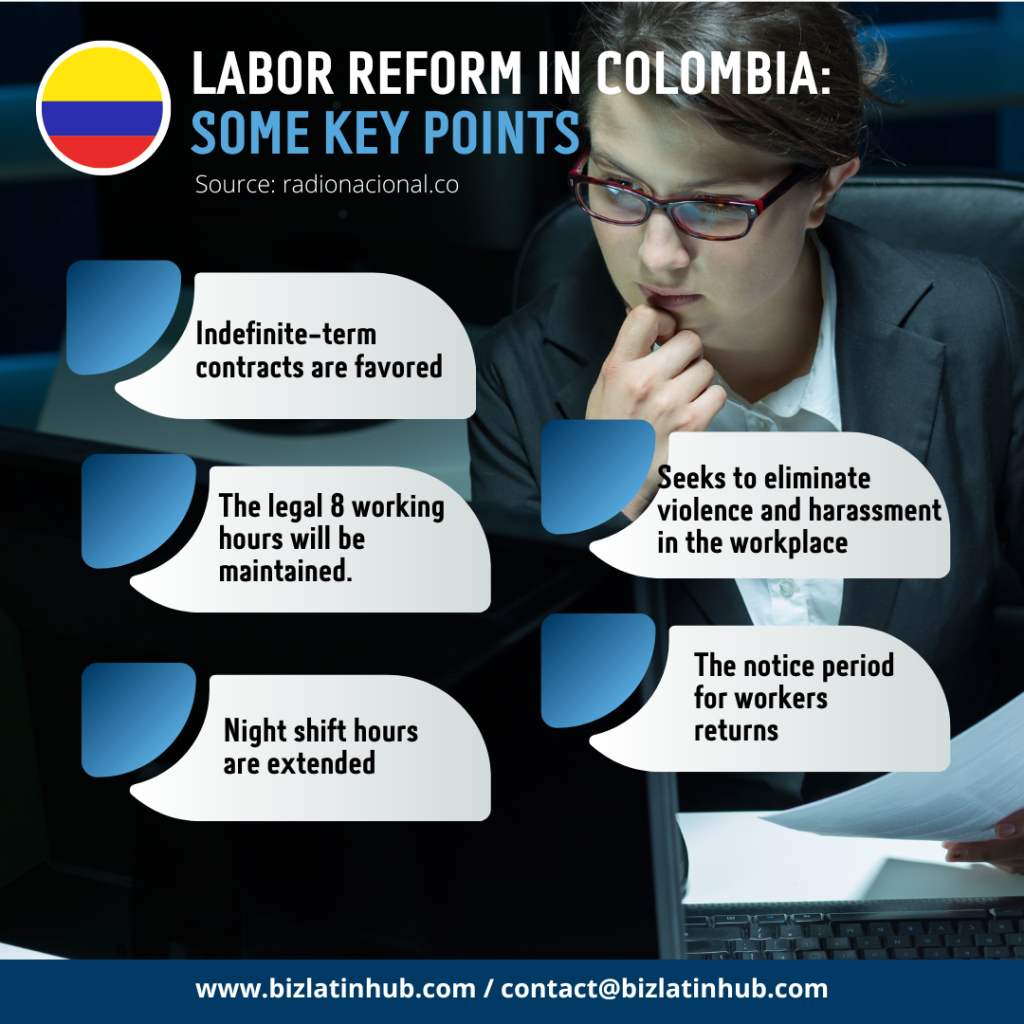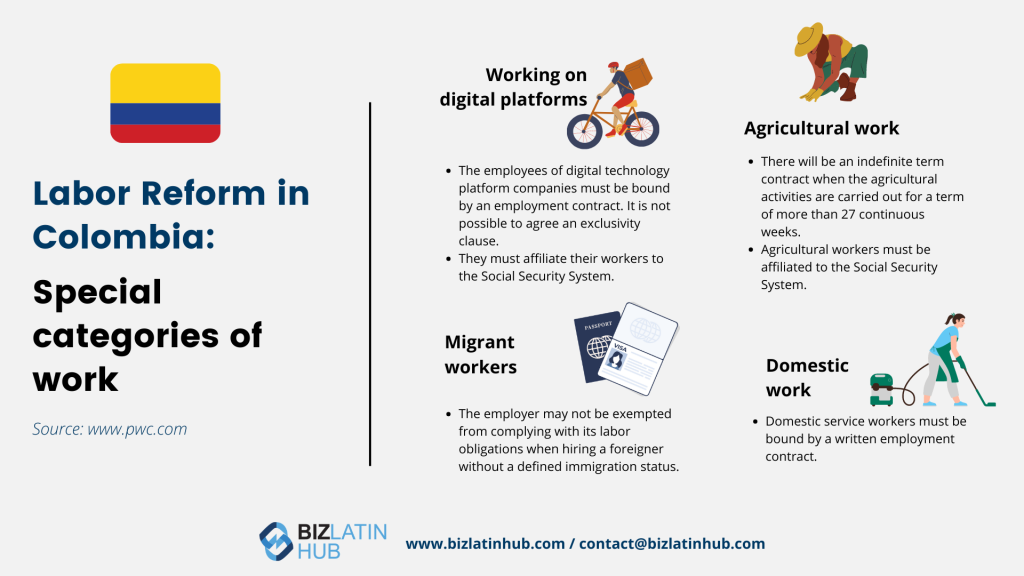Colombia’s new president is very different from the leadership of the past. Gustavo Petro is the first left-leaning leader in the country’s history, and as such has been preparing a lot of reforms to make Colombia aligned with the values he stands for. The labor reform in Colombia is one of these changes, which is certain to impact your business. Let’s take a look at what to expect if the reform is approved by Congress and how it may affect the legal requirements to start a business in Colombia.

What will change with the new labor reform in Colombia?
As this reform is comprehensive and will modify various working conditions, we will only focus on the aspects that will impact your business.
- Modifications to Labor Contracts.
- Termination of the Labor Contract.
- Compensation for Dismissal Without Just Cause.
- Working hours, leaves, and leaves of absence.
- Additional Provisions.
- Collective Labor Aspects.
1. Modifications to labor contracts:
Today, we have two main types of contracts: The Indefinite Term contract and the Prestación de Servicios, or Fixed-Term. The main difference, aside from the duration of the contract, is the obligations of the employer.
In an indefinite contract, the employer has to pay for a fraction of the cost of the employee’s healthcare, a type of work insurance, among other things. Additionally, they have to compensate any worker who has been dismissed without just cause and the employee is free to quit at any time without giving notice.
In a fixed-term contract, the employee has to take care of everything on their own. Fixed-term contracts may be extended indefinitely. However, it is important to take into account that when the contract is for less than one year, it may only be renewed three times for similar terms; after that, it must be renewed for one year.
With the new labor reform in Colombia, workers under an indefinite contract now have to give a 30-day notice before quitting, although it’s not clear if there’ll be a consequence for not complying. Also, every contract in which the duration is not specified will be understood as an indefinite contract.
The fixed-term contract is the most affected, under the reform. Today, many companies use fixed-term contracts for jobs or positions that would normally be classified as Indefinite to not pay the worker’s health insurance.
That is going to change, as they will be the exception, meaning that the company has to expressly indicate the temporary needs they have so that it’s not used to meet permanent needs.
The duration of the contract must also be specified, although it can be extended as many times as needed, provided the total duration of the contract doesn’t exceed two years.
2. Termination of the labor contract:
New criteria of reasonableness and proportionality are going to be introduced to assess violations by either the employer or the employee when terminating the employment contract for ‘Just Cause’. It also introduces an obligation for the employer to do a dismissal proceeding before any termination, otherwise, it can be ruled ineffective.
The reform also has reinforced labor stability, as additional authorization is required for a dismissal to be effective in some specific cases:
In the case of a worker with union protection, authorization from a labor judge is needed; in the case of other protected workers, such as pregnant and disabled people, authorization from the labor inspector is needed unless the person was hired under these conditions, and they are explicitly stated in the contract.
These measures are put in place to avoid discrimination in the workplace, so if the worker feels they were dismissed because of their condition, they may resort to labor courts. In these cases, the employer will have the obligation to prove the dismissal was not based on discriminatory reasonings, but rather objective ones.
3. Compensation for dismissal without just cause:
As stated before, the worker must be compensated when dismissed without just cause. Here are the main changes:
- In fixed-term contracts, the minimum compensation goes from 15 to 45 days of salary.
- In indefinite contracts, it goes a little differently:
Today, compensation in indefinite contracts is determined by the salary and how long the employee has been working at that company:
- Workers who earn less than 10 minimum monthly salaries are entitled to 30 days of salary, with 20 additional days per year worked at the company.
- Workers who earn more than 10 minimum monthly wages are entitled to 20 days of salary, with 15 additional days per year worked at the company.
The labor reform in Colombia will eliminate this differentiation, and every worker will be entitled to the same compensation, irrespective of how much they earn.
- Every worker will be entitled to 45 days of salary, with 45 additional days per year worked at the company.
4. Working hours and absences:
Weekly working hours will be reduced, extra hours and holidays will now be more expensive, additional obligatory leaves are introduced, and night work hours (which pay more than daytime work) will be extended.
The working week will go from 48 to a maximum of 42 hours. This means Saturdays will likely be now understood as extra hours, which along with Sunday and holiday work will now be paid with a surcharge of 100 percent of the ordinary salary, rather than the current 75 percent. Night-time work will be extended by 3 hours and will now be from 6:00 pm to 6:00 am.
Additionally, the understanding of a “domestic calamity” will be expanded. They include “any personal or family event, fortuitous event or force majeure whose seriousness affects the normal development of the worker’s activities”.
Lastly, two new obligatory leaves are introduced, and one is extended:
- To attend scheduled medical appointments or emergency medical appointments, these include the worker presenting incapacitating menstruation cycles, dysmenorrhea, or abdominal tension due to menstruation.
- To attend school obligations as the legal guardian of children or minor members of the immediate family.
- Paternity leave will now be 12 weeks (3 months).
5. Additional provisions:
This affects wages, so pay close attention:
The yearly salary readjustment will be at least equal to the CPI variation as of December 31st of the previous year for workers who earn two or fewer monthly minimum salaries.
If the worker can’t work because of the employer, they cannot refuse to pay salary for the days the employee has not worked. This means that if the employer asks the worker to not work, they still have to pay for those days.
6. Collective labor aspects
This is the most important aspect of the labor reform in Colombia, and will probably have the greatest impact on your business, as it entails many different topics:
Proposed changes to the regulations surrounding unions and collective bargaining include several key points.
The definition of an “employer” will be expanded to encompass contractors and their organizations, allowing for contractors to be included in union associations.
Furthermore, collective bargaining agreements that are negotiated with at least one-fifth of the total number of workers or employees of a company or groups of companies will be extended to all workers at that level, regardless of whether or not they are unionized.
The negotiations for collective bargaining must be carried out with unity of the negotiation agreement, unity of the negotiating committee, unity of the negotiating table, and conclude with the signing of a single collective bargaining agreement at each level.
However, collective bargaining agreements aimed at fixing working and employment conditions are prohibited, as are those agreements whose purpose or effect is to entrust the execution of work or services in favor of third parties in exchange for a price to workers’ organizations.
Finally, let’s talk about strikes. They are bound to become more common if working conditions are not met, due to them being further protected by the state.
The proposed changes to the regulations surrounding the right to strike include several key points.
First, the right to strike is redefined, and the State now will have to ensure that all workers, whether unionized or not, have the fundamental right to strike in all its forms, including partial strikes. The right to strike is also now contemplated in companies or entities that provide public services.
Every strike has to comply with the legal requirements to be declared. This is shown by how the majority rules for the approval of the strike are now regulated:
For workers to strike within the framework of negotiation of a company agreement, it must be approved by a majority of workers affiliated with the union or unions involved with the conflict when they represent at least one-third of the workers of the company; and strikes can now only be initiated after a two-day notice has been given to the employer, except in the case of strike attributable to the employer.
The instances where striking is deemed illegal have been limited to only three scenarios:
- When in essential services the provision of minimum services is not complied with, when it is not peaceful, or when prior notice is not given when required.
- The employer is no longer able to dismiss workers who have legally declared a strike and the sanctions that the employer can exercise against those responsible for an illegal strike are eliminated.
- The maximum duration of the strike of 60 days is eliminated, and workers under union autonomy can extend the strike until they deem it pertinent or request the convening of an arbitration tribunal at any time.

How can the Labor Reform in Colombia affect your business?
The working conditions in Colombia are about to change drastically, whether this or other versions of the Labor Reform are accepted.
There is no way of knowing yet if these changes will be good for your specific company. Understanding the proposed changes will be beneficial for your business in the long term as compliance with legal requirements in Colombia will help avoid penalties.
Biz Latin Hub can help you with the Labor Reform in Colombia
At Biz Latin Hub, we provide integrated market entry and back-office services throughout Latin America and the Caribbean, with offices in Bogotá and Cartagena, as well as over a dozen other major cities in the region.
Our unrivaled reach means we are ideally placed to support multi-jurisdiction market entries and cross-border operations.
As well as knowledge about the Labor laws in Colombia, our portfolio of services includes hiring & PEO accounting & taxation, company formation, bank account opening, and corporate legal services. Contact us today to find out more about how we can assist you in finding top talent or otherwise doing business in Latin America and the Caribbean.






